
Sustainable Demolition How Companies Minimize Waste
The building sector is focusing on eco-friendly procedures in an age when sustainability is a need rather than an option. Presenting “sustainable demolition,” a cutting-edge method that aims to reduce waste and reuse resources. Businesses all across the world are using cutting-edge techniques to make sure that the old is integrated into the cycle of reuse and regeneration rather than just being replaced by the new.
Through their emphasis on conscientious demolition, recycling, and material recovery, these trailblazers are not only protecting the environment but also establishing new benchmarks for ecological responsibility. Come learn how progressive businesses are driving the way in sustainable demolition, converting possible waste into useful resources, and having a big influence on the health of our world.
OUR SERVICES
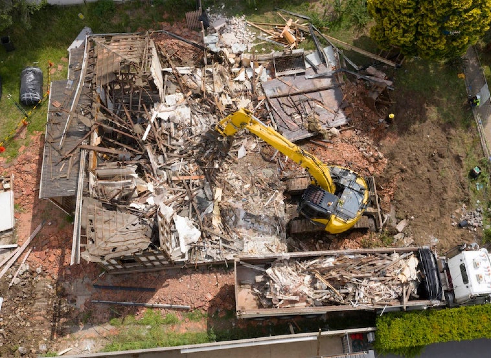
Structure Demolition. Residential, Commercial & Industrial
If your structure poses a health, safety, or environmental risk, demolition can prevent costly citations or fatal accidents. While this may seem daunting, you are just a phone call away from having your residential demolition done professionally, responsibly, and at a great price.
Talk to a Demolition Specialist Now! 916.249.5001
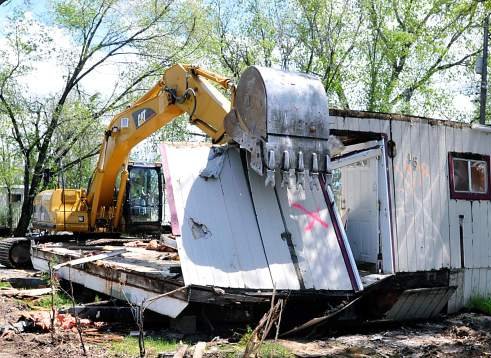
Mobile Home Demolition
We demolish and haul away mobile homes. Any size, anywhere, anyhow. We are fast, clean and competitive. We serve most of Northern California. There are many factors to consider when removing or demolishing your old trailer, mobile home, or manufactured home like: the processes involved, costs, time, contractors, debris, and permits.
Talk to a Demolition Specialist Now! 916.249.5001
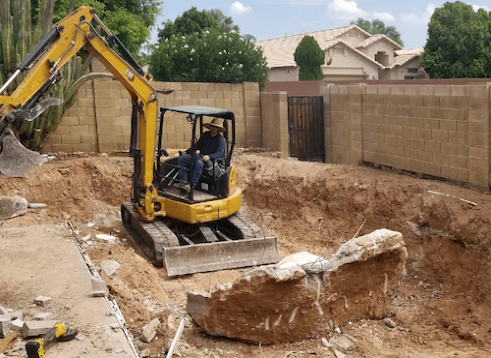
Pool Demolition
When removing a pool in Sacramento, California with the professional demolition team of Maxton Demo, you’re guaranteed peace of mind from beginning to end. From your initial request for an estimate to clean-up, you can expect our pool demolition process that’s completely professional and safe.
Talk to a Demolition Specialist Now! 916.249.5001
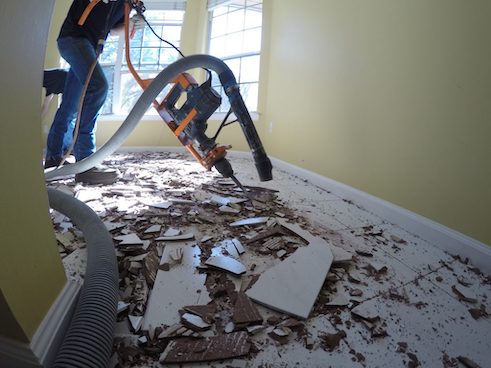
Floor Demolition
Flooring demolition, like any other major home renovation work, requires a specific set of skills and tools to be performed properly. You need experts in flooring demolition to get you the best floors possible. Contact us to find out more about how we can help you today.
Talk to a Demolition Specialist Now! 916.249.5001
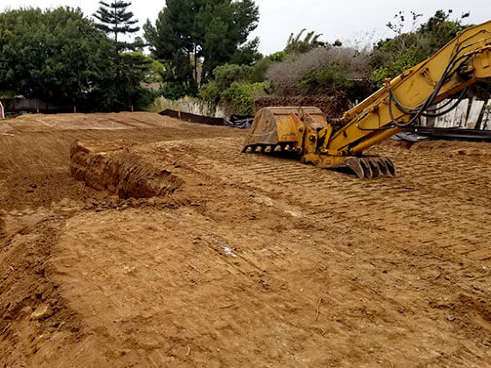
Grading & Excavating
If you need an experienced excavator and grader in Sacramento, call us today. One of the many reasons that residential, commercial, and industrial customers choose to work with us is because we’re able to provide a broad range of services to help construction-related projects get done in less time and at a reduced cost.
Talk to a Demolition Specialist Now! 916.249.5001

Roof Snow Removal
Heavy snow & ice dams can cause significant roof and home damage. Roof Snow removal is our specialty during the winter months. Serving the Sacramento, California area for 10 years, we can get your roof snow removed and promise a quick response and reasonable rates.
Talk to a Demolition Specialist Now! 916.249.5001
The Value of Ecological Demolition
The urgent need to address the substantial environmental impact of the building sector gives rise to the push for sustainable demolition. Massive volumes of debris are often produced by traditional demolition techniques, and a large portion of this waste ends up in landfills, adding to pollution and resource depletion. Sustainable demolition places a higher priority on the health of the earth and seeks to lessen these effects by using more deliberate, environmentally responsible methods.
Furthermore, the frequency of building replacements and renovations rises with the continued growth and development of metropolitan centers. This pattern emphasizes how crucial it is to include sustainability in all demolition projects in order to protect the environment for future generations. Businesses may help create a building environment that is more sustainable by seeing destroyed materials as assets rather than garbage.
The shift to sustainable demolition is also in line with consumer desire for more environmentally friendly techniques and global sustainability objectives. Therefore, businesses that adopt these strategies are not only benefiting the environment but also establishing themselves as leaders in a sector that is evolving quickly.
Essential Guidelines for Sustainable Demolition
Sustainable demolition is based on a number of fundamental ideas intended to reduce negative environmental effects. The first and most important rule is “deconstruction over demolition,” which stresses meticulous building disassembly in order to save components for future use. This method stands in stark contrast to conventional demolition, which involves demolishing structures rapidly and often causing damage to priceless resources.
Recycling and material reuse are yet another essential component of sustainable demolition. Businesses may drastically cut waste by rescuing materials like concrete, metal, and wood. By giving these materials a second chance at life in other building projects, they may support a circular economy that benefits the industry and the environment.
Finally, sustainable demolition techniques are guided by waste hierarchy principles, which rank activities in the following order of importance: recycle, reuse resources, reduce waste output, and avoid waste. This hierarchy makes sure that each action made during a demolition operation advances sustainability as a whole.
Methods for Reducing Waste
Companies use a variety of strategies to implement the ideas of sustainable demolition. One popular technique is selective dismantlement, in which laborers remove and sift things with care so they may be recycled or used again. In addition to saving resources, this method is often less expensive than conventional demolition.
Using green demolition equipment, which is designed to be more productive and emit less pollution, is an additional strategy. These technologies, which range from electric demolition equipment to dust- and noise-reducing instruments, are essential for reducing the negative environmental effects of demolition.
Sustainable demolition also requires the use of material recovery facilities, or MRFs. By processing demolition trash, these businesses reduce the quantity that ends up in landfills by sorting out recyclable elements. Businesses may guarantee that a significant amount of demolition trash is recycled or reused by using MRFs.
Advantages of Material Recycling and Reuse
There are several advantages to recycling and repurposing materials from demolition operations. It may reduce the cost of a project economically by eliminating the requirement for new materials and disposal expenses. It protects the environment by preserving resources and lowering greenhouse gas emissions brought on by the production of new goods.
Socially, environmentally friendly demolition techniques may promote a feeling of belonging and accountability. Businesses that give away recovered materials to nonprofits or neighborhood initiatives not only assist the underprivileged, but they also foster goodwill among neighbors.
Reusing materials also helps older structures retain their historical and architectural value. By bridging the gap between the past and the future, elements like ancient wood or historical bricks may bring character and value to modern building projects.
Cutting-Edge Technologies for Ecological Demolition
Technological developments are opening the door to more efficient, environmentally friendly demolition techniques. For example, robotics is being utilized more and more to precisely remove buildings, saving waste and enhancing worker safety. Additionally, the use of drones and 3D scanning technology helps firms plan demolitions more precisely and find salvageable items.
Another innovation is the use of biodegradable water-based solvents to soften adhesives and facilitate the removal and recycling of materials like carpets and tiles. These solvents are safe for the environment and aid in reducing the hazardous waste generated during demolition.
Last but not least, the use of digital channels for material exchange is growing. These platforms facilitate resource reuse and waste reduction by bringing businesses with excess materials in contact with those in need.
Guidelines and Approvals for Eco-Friendly Demolition
A number of laws and certifications have been put in place to promote and standardize sustainable demolition techniques. One of the most prestigious certifications, LEED (Leadership in Energy and Environmental Design), honors projects that show a dedication to sustainability, including resource efficiency and waste minimization during deconstruction.
Governments at all levels are also putting laws into place that mandate or promote sustainable demolition techniques. These regulations often contain requirements for recycling a certain proportion of demolition debris or for using deconstruction techniques in order to conserve items.
Companies may guarantee compliance and show the public and customers how committed they are to sustainability by following these guidelines.
Problems and Remedies in Ecological Demolition
Sustainable demolition has drawbacks, despite its numerous advantages. The greater initial outlay and time commitment needed for material sorting and disassembly represent a major obstacle. In order to solve this, businesses can take advantage of government incentives and spend money on educating employees to use sustainable practices more effectively.
The little market for certain recovered materials presents another difficulty. Overcoming this challenge may be accomplished by strengthening networks for the interchange of materials and raising public awareness of the importance of repurposed resources.
Finally, the implementation of sustainable demolition may be hampered by legal restrictions and the absence of standard operating procedures. In order to press for more favorable policies, industry stakeholders must continue to advocate and work together.
The Prospects for Ecological Demolition
With ongoing advancements and rising public awareness of the value of sustainability in building, the future of sustainable demolition seems bright. As more businesses adopt and improve environmentally conscious procedures, sustainable demolition will probably become the norm rather than the exception.
The building sector can greatly lessen its environmental impact by making deconstruction, recycling, and material reuse its top priorities. Sustainable demolition has social and economic advantages, in addition to resource conservation and trash reduction.
It’s obvious that sustainable demolition will be essential to forming a more environmentally and socially conscious building sector in the future. Businesses may continue to have a beneficial influence on the environment for future generations by working together, being innovative, and being committed to sustainability.
Recycling and Upcycling: An Overview from Demolition Company
It is impossible to exaggerate the significance of recycling and reusing in today’s society when sustainability is crucial. Demolition businesses are leading this trend since they handle large volumes of waste material and are in charge of demolishing buildings and other structures. Adopting eco-friendly procedures is important for these firms in order to reduce their environmental impact.
This extensive manual from demolition businesses seeks to provide insight into practical recycling and repurposing tactics that may be used in the course of destruction. This book includes useful tips to encourage sustainability, such as repurposing resources like concrete, metal, and wood and salvaging them.
This book can provide helpful information and ideas, whether you are a demolition firm trying to improve your green activities or just a supporter of environmental responsibility. We can lessen landfill trash, improve the environment, and build a more sustainable future by embracing recycling and reusing.
Come along as we delve into the realm of recycling and repurposing and learn how demolition businesses are paving the way for a future with less environmental impact.
The Demolition Industry’s Need for Recycling and Repurposing
Reusing and recycling materials from demolition sites preserves natural resources while lowering the quantity of rubbish dumped in landfills. Companies that specialize in demolition play a vital part in the construction and demolition (C&D) waste management cycle, which is becoming more and more acknowledged as an essential element of sustainable development.
Demolition companies may drastically reduce their carbon footprint by using practices that give material recovery first priority. This strategy supports a circular economy, which lowers the demand for raw resources by reusing and recycling products, and it is in line with international initiatives to slow down climate change.
Furthermore, recycling and reusing may assist demolition businesses financially. Salvaging priceless items, such as metals, may provide income streams and reduce the cost of destruction. Adopting green practices may also improve a business’s brand and attract customers that value environmental sustainability.
Advantages of Material Recycling and Repurposing
Recycling and reusing materials from demolition operations has significant positive effects on the environment. We reduce greenhouse gas emissions and the use of priceless land by diverting garbage from landfills. Recycled materials may be used in lieu of new ones in building and manufacturing, further conserving resources.
Reusing and recycling materials may have significant financial benefits. There are established markets for recycled materials such as copper, steel, and recovered wood that provide demolition businesses with profitable options. This financial incentive may spur innovation in materials handling and demolition methods, resulting in more effective and environmentally friendly procedures.
Socially, adopting recycling and repurposing encourages community involvement by fostering employment growth in the recycling industry and by donating recovered materials to nearby groups and initiatives. By doing this, communities are able to trust and support demolition businesses more, strengthening their social license.
Typical Items for Demolition Projects That Can Be Recycled or Used Again
Demolition sites may provide a variety of items that can be recycled or used again. Because they can be recycled repeatedly without degrading, metals like copper and steel are greatly sought after for recycling. Reclaimed wood may be used for building, furniture, or biomass energy.
Another common material found in demolition trash is concrete, which may be broken and utilized again as aggregate in new building projects. Bricks retain both their aesthetic and utilitarian value when cleaned and reused in landscaping or buildings.
Although they are not as often recycled in deconstruction, glass and plastics may be used in creative ways. For example, certain plastics may be recycled into new building materials, and broken glass can be used to build roadbeds.
Methods and Procedures for Material Recycling and Repurposing
Thoroughly planning and evaluating the demolition project is the first step towards effectively recycling and reusing demolition materials. It’s crucial to identify salvageable materials and choose the best recycling or repurposing options.
When compared to mechanical destruction, deconstruction enables the highest possible material recovery. Buildings and other structures are dismantled during this procedure in order to save and recycle as much of the material as possible.
Materials need to be treated once they are retrieved. This may include organizing, cleaning, and sometimes repurposing resources. For instance, concrete may need to be broken into aggregate, and wood may need to be detailed and chopped to size.
Difficulties and Things to Think About When Recycling and Repurposing Materials
Although the advantages are obvious, recycling and reusing materials from demolition sites presents some difficulties. The feasibility of recycling certain materials may be impacted by changes in the markets for recycled resources. Furthermore, logistical issues including the storage and transportation of recovered items might affect productivity and expenses.
Environmental norms and laws can have a significant influence on how demolition businesses operate. Maintaining compliance while optimizing material recovery requires meticulous preparation and respect for industry standards.
The initial cost of deconstruction and sorting, which might be more than that of conventional demolition techniques, is another factor to take into account. Nevertheless, the sale of recycled materials and the decreased disposal fees often balance these expenses.
The Best Ways to Include Recycling and Repurposing in Projects, Including Demolition
Demolition businesses may use a number of best practices to get beyond these obstacles. It is essential to have a comprehensive waste management strategy prior to starting any demolition operation. The materials that may be salvaged and the methods for their processing and recovery should be described in this strategy.
Creating alliances with nearby recycling centers and building firms might provide dependable markets for repurposed materials. Enhancing productivity and recovery rates may also be achieved by providing personnel with training on material handling and deconstruction procedures.
Furthermore, using technology to monitor and control material flow might improve demolition projects‘ sustainability. Deconstruction debris may be reused and recycled more effectively with the help of tools like materials databases and digital marketplaces for exchanging reclaimed resources.
Organizations and Resources to Support Recycling and Repurposing Initiatives
Demolition businesses may get assistance from a number of organizations and services for recycling and reusing their materials. Guidelines and best practices for sustainable demolition are often offered by industry groups. Governmental organizations may provide regulatory guidelines along with incentives for recycling and reusing.
Nonprofit groups committed to sustainability in building and demolition may be excellent collaborators, providing knowledge, chances for networking, and access to cutting-edge materials recycling research and development.
Furthermore, internet directories and platforms may link demolition firms with prospective consumers of recycled materials, growing the market and simplifying the process of locating environmentally friendly disposal options for demolition trash.
Recycling and Repurposing in the Demolition Industry: A Bright Future
Recycling and repurposing in the demolition sector seem to have a bright future since sustainable techniques are becoming more and more in demand. Demolition firms will have more options to support a circular economy as long as technology continues to progress and markets for recovered materials continue to rise.
Demolition firms may significantly lessen the environmental effect of building and demolition, save resources, and pave the path for a more sustainable future by adopting recycling and repurposing.
It takes a team to achieve sustainability, and the demolition sector is well positioned to have a big beneficial influence. Recycling and repurposing may become regular procedure in demolition with sustained innovation, teamwork, and dedication to best practices, which will benefit society and the environment in general.
Do you have a Question?
Talk to a Demolition Specialist Now! 916.249.5001
Request Formal Quote